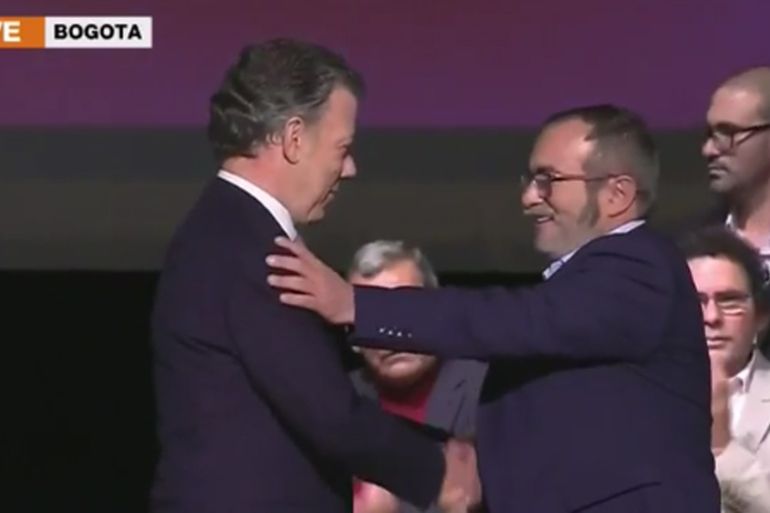Colombia signs revised peace deal with FARC rebels
Government and FARC rebels sign new peace accord but public opinion over new agreement remains deeply divided.

Colombia’s government has signed a revised peace agreement with the armed group FARC aiming to end half a century of hostilities, nearly two months after the rejection of the original deal in a referendum.
President Juan Manuel Santos and FARC leader Rodrigo “Timochenko” Londono signed the 310-page accord on Thursday at the Colon Theatre in the capital Bogota.
Keep reading
list of 4 itemsColombia agrees with ELN rebel group to extend truce
Amid uptick in kidnappings, Colombian family receives ‘biggest gift of all’
Her son was killed by the Colombian military. Now, she’s getting an apology
|
|
“We can turn the page on violence,” Santos said after the signing, while praising the “persistence” of the negotiators to reach a “better” agreement.
For his part, rebel leader Londono said: “The word should be the only weapon in Colombia,” adding that the new deal took into account “the concerns made by many sectors” of society.
The two men shook hands amid loud cheers from the audience.
The hastily organised ceremony was a far more modest and sombre event than the one in September in the city of Cartagena, where the two leaders had signed an accord in front of an audience of foreign leaders and United Nations Secretary-General Ban Ki-Moon.
READ MORE: Colombia reaches new peace deal with FARC rebels
The new agreement introduces some 50 changes intended to assuage critics led by still-powerful former president Alvaro Uribe.
They range from a prohibition on foreign magistrates judging crimes by the FARC or government, to a commitment from the armed fighters to forfeit assets, some of them amassed through drug trafficking, to help compensate their victims.
But the FARC would not go along with the opposition’s strongest demands: jail sentences for rebel leaders who committed atrocities and stricter limits on their future participation in politics.
Public opinion has been divided on the signing of the deal, as some overwhelmingly loathe the FARC, or the Revolutionary Armed Forces of Colombia, for crimes such as kidnappings and drug-trafficking, while others want peace to prevail.
However, a recent wave of alleged assassinations in conflict areas has raised pressure on the government to seal a peace deal fast.
“There is no time to waste,” Santos said in a televised statement on Monday.
“Lives have been lost and many more are in danger.”
The revised deal aims to end 52 years of conflict that has killed more than 220,000 people and displaced millions.
Period of uncertainty
However, a period of discord and uncertainty looks certain from now on, as opponents threatened to resist the revised deal.
“We invite citizens to persist in the struggle for the future of democracy,” said Uribe’s Democratic Center party.
“In the coming days, we will examine various actions to call the people into the streets and democratic spaces,” it party said in a statement.
Al Jazeera’s Alessandro Rampietti, reporting from Bogota, said Santos is determined to go ahead despite the opposition.
“This new deal will not go to a second referendum,” he said, noting that Santos will instead introduce it in Congress where it is expected to gain approval.
Government and FARC negotiators presented the redrafted version earlier this month.
Uribe, however, complained that it still did not satisfy his key demands, notably punishing FARC leaders for their crimes.
“I think the agreement is not perfect. I think there will be impunity. I think these people remain criminals even if they are respecting the agreement,” Ignacio Greiffenstein, a Bogota resident, told Al Jazeera.